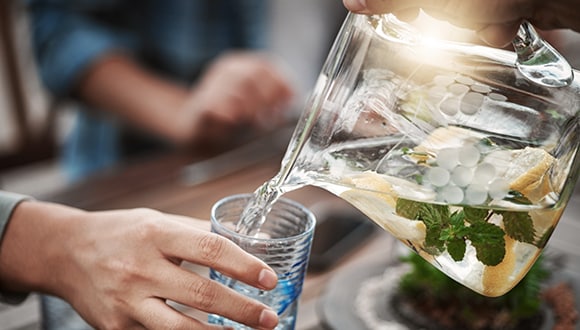Is there more to hydration than drinking water?
Staying hydrated is important for maintaining muscle and brain performance and general health. But it’s not just about counting cups of water each day. Here are some key ways to keep hydrated.
Jo Hartley
February 2019
We all know the importance of keeping hydrated, especially during the hot summer months.
Hydration is important for temperature regulation, digestion, exercise endurance, flushing your body’s waste and getting enough nutrients.
But just how much water do you need to drink to remain hydrated and what other sources can help?
“The general consensus for daily water intake is between 6 and 8 glasses,” says accredited dietitian Natasha Murray (this equates to about 2 litres a day). “But it varies for each person, based on age, gender, body composition, the temperature and humidity, and how active we are.”

Hints that you need to hydrate
The best way to tell if you’re hydrated enough is to monitor your urine. If it’s pale yellow, straw coloured or clear, you’re drinking enough. If it’s darker, it’s time to drink a bit more. Really dark (black or red) urine could be a sign of blood which may be a symptom of a serious medical issue in your kidney, prostate or bladder. See your GP if you notice this.
Other signs of dehydration include:
- headache
- decreased concentration and alertness
- dry lips
- in advanced dehydration you might also experience cold clammy skin and a swollen tongue.
“It’s best to drink regularly throughout the day,” advises Murray. “This helps your body stay hydrated, instead of dropping to dehydrated and then having to rehydrate.”
In the summer months, you may sweat more and spend more time in the sun, so you may need to increase your fluid intake. And if you have a fever, you may need to drink more than usual too.
What about tea and coffee?
“Research has shown that tea and coffee aren’t dehydrating, as long as you’re not going overboard,” advises Murray.
Better Health Victoria recommends no more than 400mg of caffeine (about 3 espressos) a day.
Caffeine may have a mild diuretic effect, increasing the production of urine and leading to fluid loss. But “the caffeine in 2 cups of coffee, or 5 cups of black tea, doesn’t increase urine production, so caffeinated and non-caffeinated drinks hydrate you about the same,” Murray says.
Sports drinks
If you’re heading off on a long walk, run or bike ride then sports drinks might be an option to help boost your fluids. They can provide the right balance of carbohydrate, electrolytes and fluid to fuel exercise and hydration. Otherwise, stick to water.
The sodium in sports drinks can increase fluid absorption and retention, reports Sports Dietitans Australia. But water works almost as quickly. It’s also been proven that when compared to plain water, people are more likely to drink sports drinks because of the flavour.
However Murray cautions that too much sports drink can upset your stomach, so if you decide to drink them, have small amounts regularly. They’re also not appropriate for children, reports Harvard Health.
Keep in mind there’s a big difference between sports drinks and energy drinks – both contain sugar but energy drinks usually contain caffeine too.
Oral rehydration therapy
Oral rehydration therapy may help adults and children with severe vomiting or diarrhoea to replace lost fluid. It’s a glucose and electrolyte solution, for example tablets that dissolve in water.
Speak to your pharmacist before taking any new medication.
Coconut water
“Coconut water has become a popular alternative to juice, soft drinks and energy drinks,” says Murray. “It provides a healthier alternative to high-sugar drinks.” But the health claims of coconut water aren’t well supported.
Does coconut water hydrate as well as water? So far, the research isn’t consistent.
Smoothies
Smoothies can be a great on-the-go option and an easy way to boost fruit and veg intake. And because fruit and veg contain water, smoothies will help with overall hydration. But Murray says to be aware of ingredients and portion sizes, such as large numbers of fruits, ice-cream or frozen yoghurt, as these can increase the kilojoule content.
Foods that keep you hydrated
Foods like milk, yoghurt, soup and even rice and pasta have a high water content, as do many fruit and vegetables, especially watermelon, stone fruits, citrus, tomatoes and cucumber.
“Try freezing fruits like watermelon and oranges for a delicious and hydrating treat,” says Murray.
In winter, Murray says soups and casseroles are a great way to help keep hydrated, and warm.
Hydration tips
Murray provides the following tips for keeping hydrated.
- Make sure you have easy access to water, on your desk, in your bag, etc.
- Invest in a nice glass or water bottle to drink out of.
- Start and end your day with a glass of water.
- If you’re drinking alcohol, alternate between alcoholic drinks and water.
- If you’re exercising in hot weather, drink water throughout and afterwards.
- For added flavour, add fruits and herbs or a squeeze of lemon or lime to water – studies show this is likely to make drinking more appealing.
Related articles
FASTING – DOES IT REALLY HELP YOU LOSE WEIGHT?
Various fasting diets claim you can lose weight, improve your health and potentially extend your lifespan. We find out what the evidence is.
6 COMMON DIET MYTHS, BUSTED
When it comes to diet and nutrition, there are plenty of misconceptions out there. We sort fact from fiction to help you stay on track.
HEALTHY DIET OR FOOD FAD?
If you’re confused about the health benefits of the latest popular diets here’s what you need to know.
IS CAFFEINE SAFE FOR TEENAGERS?
From flat whites to energy drinks, Australian adolescents drink a surprising amount of caffeine. Here’s how it affects their health.